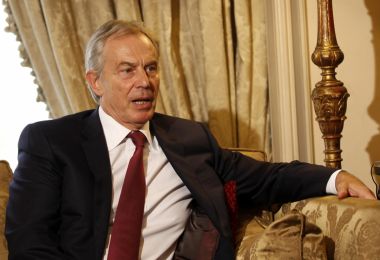Secularists condemn Blair's anti-extremism proposals

Anti-extremism proposals backed by Tony Blair would have a "massive chilling effect on free speech," the National Secular Society (NSS) has warned.
The former prime minister announced earlier this week that he will take on the role of chairman of the European Council on Tolerance and Reconciliation (ECTR), after standing down as the Middle East peace envoy, representing the US, EU, UN and Russia. In his new position, he will be charged with working to end racism and anti-Semitism in Europe.
The ECTR has campaigned for harsher laws to counter extremism, and Blair set out his plans for his new role in an article for the Times yesterday. In it, he claims that "intolerance is tearing the fabric of our society".
"Racism and discrimination in the name of religion must be tackled with tough new laws," he said in the article co-written by ECTR president, Moshe Kantor.
"It is our firm belief that it is not religion or faith per se that causes or foments conflict. It is the abuse of religion, which then becomes a mask behind which those bent on death and destruction all too often hide."
Legislation proposed by the ECTR, and backed by Blair, includes "lowering the barriers to what constitutes incitement to violence", making it illegal to deny the holocaust and "entrenching state funding for religious institutions into law".
The NSS has branded these proposals "ill thought out and counterproductive". The measures would "have a massive chilling effect on free speech and would be likely to restrict the open debate necessary to resolve problems," the organisation added in a statement.
Executive director of the NSS, Keith Porteous Wood, said Britain's "draconian" laws already fail to adequately protect freedom of expression, and that Blair's suggestions would "play into the hands of those intent on closing down honest debate about and within Islam".
"A robust civil society with a deep commitment to free expression is our best hope for challenging and countering bigoted narratives and misguided views," Wood said.
"Driving extremist views underground will only allow them to fester and allow their proponents to present themselves as martyrs."
Index on Cencorship, a campaigning publishing organisation for freedom of expression, has also warned that the ECTR's plans run the risk of "driving extremist views underground where they can fester and grow".
CEO Jodie Ginsberg said: "Instead, we should be protecting free expression, including speech that may be considered offensive or hateful, in order to expose and challenge those views."
Wood also condemned the Holocaust denial law, insisting that it would be used by "dictators abroad – and Islamists at home" whenever the UK criticised human rights abuses or challenged rhetoric.
"Outlawing Holocaust denial completely undermines the West's defence of freedom of speech at home and abroad and removes our moral authority to propound freedom of expression abroad. No one has the right in a plural society not to be offended and ideas should not be proscribed but people should be defended from incitement to violence."
Times columnist Oliver Kamm agrees. He labelled Blair "dangerously wrong".
"What's wrong with Holocaust denial is not that it's offensive and hateful (though it certainly is both) but that it's flat-out false," he wrote. "An empirical claim that is false and fraudulent is properly countered with evidence, not suppression."
As for "entrenching" government funding for religious institutions, Wood said the state should remain entirely separate.
"It's hard to see what justification Mr Blair could have for making such a vague and deeply anti-secular proposal," he said.











